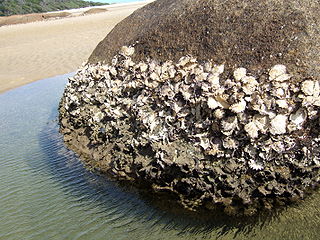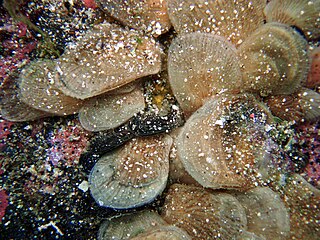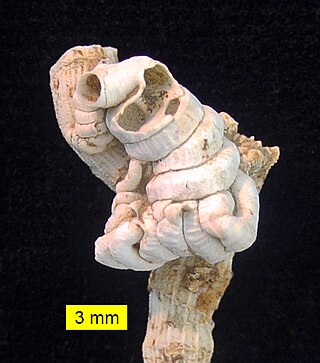
Crassostrea is a genus of true oysters containing some of the most important oysters used for food. Some species in the genus have been moved to the genus Magallana.

The Ostreidae, the true oysters, include most species of molluscs commonly consumed as oysters. Pearl oysters are not true oysters, and belong to the order Pteriida.

Spondylus is a genus of bivalve molluscs, the only genus in the family Spondylidae. They are known in English as spiny oysters or thorny oysters.

Scutigera is a centipede genus in the scutigeromorph family Scutigeridae, a group of centipedes with long limbs and true compound eyes. It compose of more than 30 species, including the most common and well-studied Scutigera coleoptrata.

Ostrea is a genus of edible oysters, marine bivalve mollusks in the family Ostreidae, the oysters.

Barbatia is a genus of "bearded" ark clams, marine bivalve mollusks in the family Arcidae, the ark clams.
Cardita is a genus of marine bivalve molluscs in the family Carditidae.

Rock oysters are true oysters of the genus Saccostrea, belonging to the subfamily Saccostreinae of the family Ostreidae.

Isognomon is a genus of marine bivalve mollusks which is related to the pearl oysters.

Modiolus, the horsemussels, are a genus of medium-sized marine bivalve molluscs in the family Mytilidae.

Pycnodonte is a genus of extinct oysters, fossil marine bivalve mollusks in the family Gryphaeidae, the foam oysters or honeycomb oysters. Shells of species in this genus are found around the world in fossil shell beds from the Valanginian to the Early Pleistocene. They are a commonly found fossil in Cretaceous shellbeds of the Navesink Formation in New Jersey.

Patella is a genus of sea snails with gills, typical true limpets, marine gastropod mollusks in the family Patellidae, the true limpets.

Mesalia is a genus of sea snails, marine gastropod mollusks in the family Turritellidae.

Plicatula is a genus of saltwater clams, marine bivalve molluscs, known commonly as kitten's paws or kittenpaws in the family Plicatulidae.

Cardioidea is a taxonomic superfamily of saltwater clams, marine bivalve molluscs consisting of the extant Cardiidae (cockles) and the extinct Pterocardiidae.

Chama is a genus of cemented saltwater clams, marine bivalve molluscs in the family Chamidae, the jewel boxes.

Petaloconchus intortus is an extinct species of sea snail, a marine gastropod mollusk in the family Vermetidae, the worm snails or worm shells.

Pseudochama is a species of bivalve mollusc in the family Chamidae.
Vulsella is a genus of bivalves belonging to the family Vulsellidae.

















